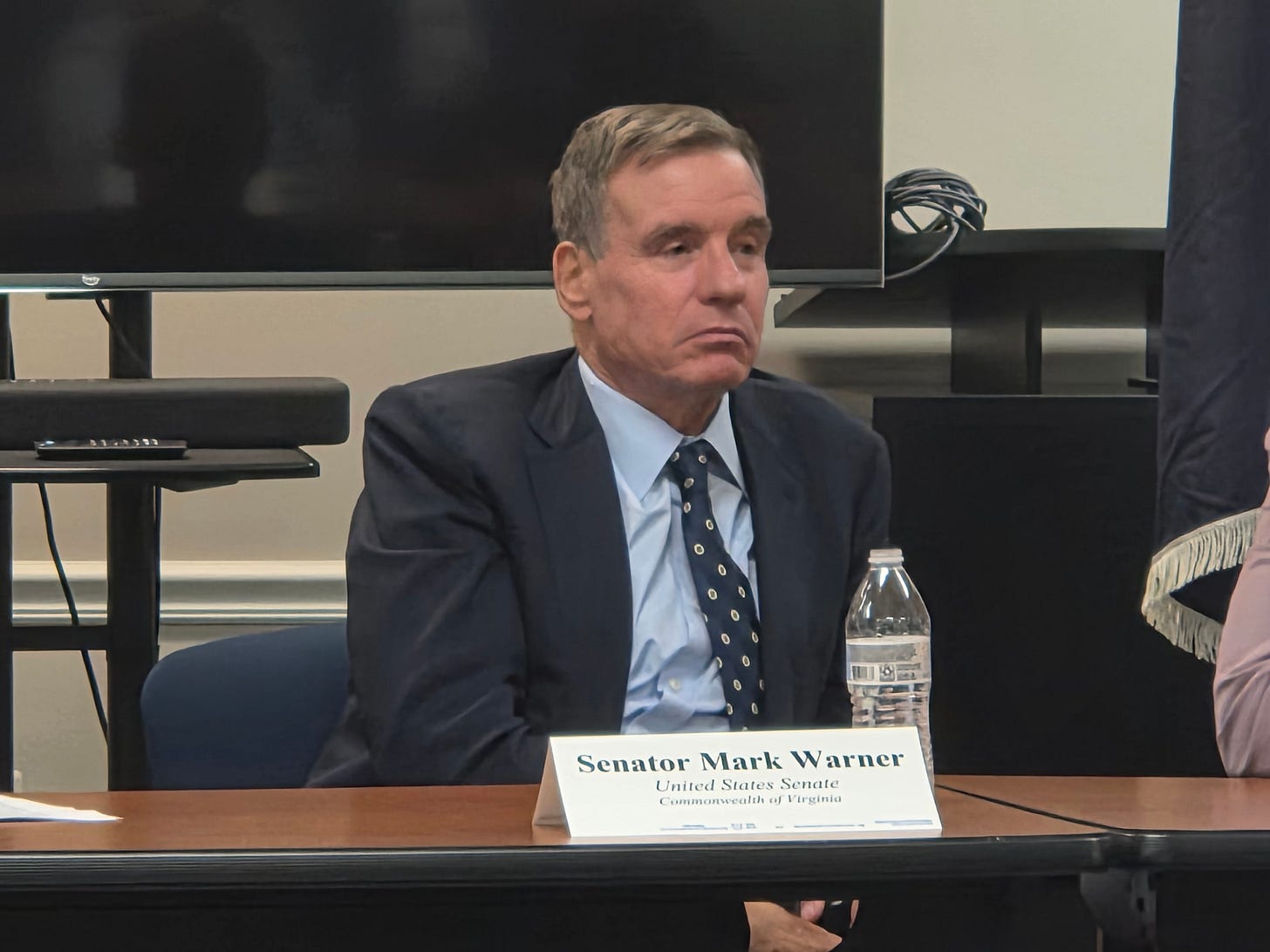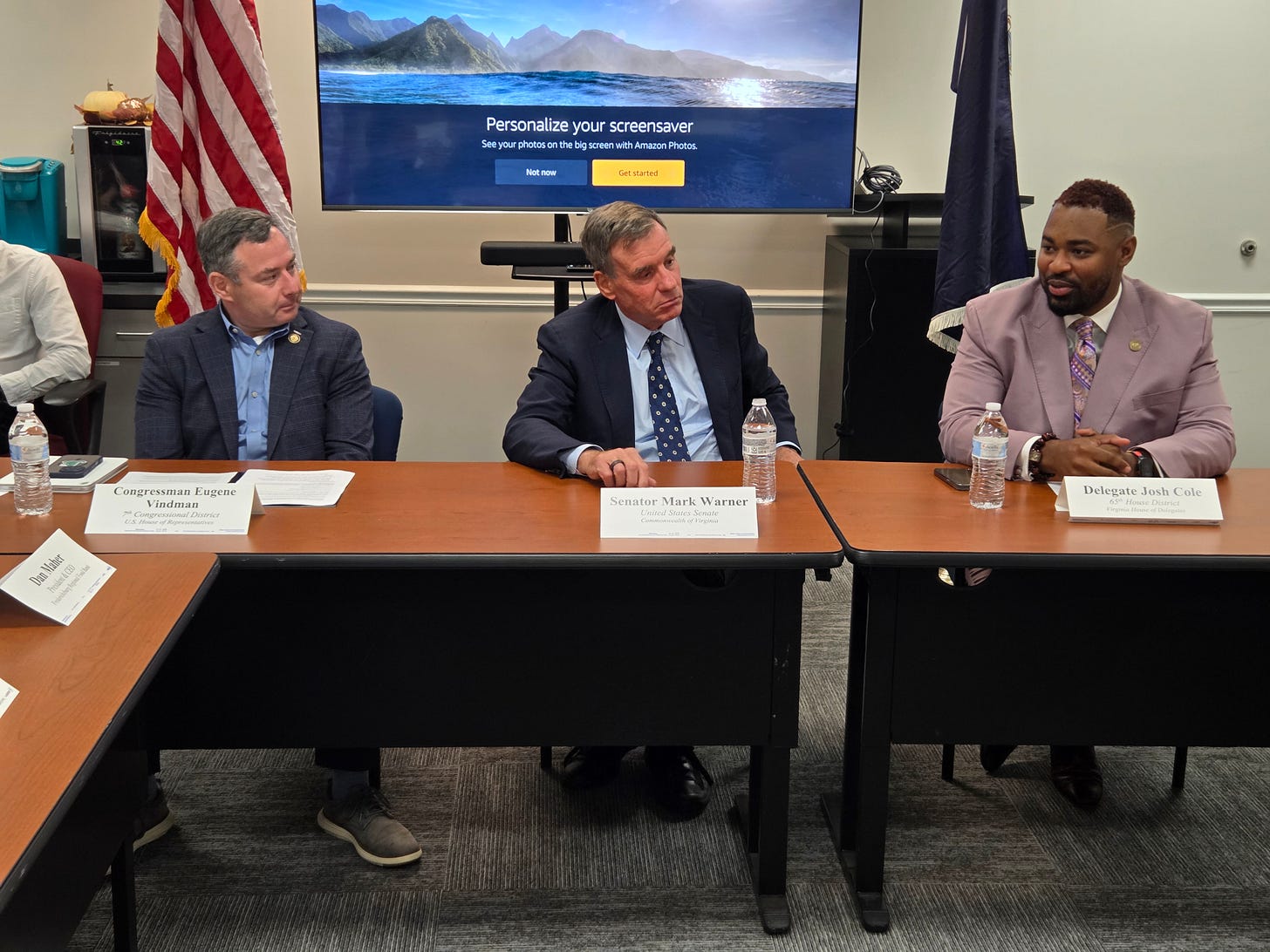Despair, Hope, and Jenga at Sen. Warner's Roundtable
Thursday's gathering of local leaders at the Fredericksburg Regional Food Bank to discuss SNAP cuts covered plenty of bad news; but signs that the community is moving forward emerged, too.
By Martin Davis
EDITOR-IN-CHIEF
Email Martin

Sen. Mark Warner (D - Va.) came to the Fredericksburg Regional Food Bank for a listening session about deep federal cuts to the Supplemental Nutrition Assistance Program (SNAP).
He heard very little, however, about SNAP. A program that helps some 42 million people — about 13% of the U.S. population — with their nutritional needs and is being slashed by the Trump Administration by some $186 billion through 2034.
He heard a lot about the damage being done to local communities by the administration’s slash-and-burn approach to the federal government as the so-called Big, Beautiful Bill begins to bite into American communities.
Hate to Be the Bummer
Warner, who has a recognized track record of working across the aisle, dropped diplomatic pretense at the roundtable with Fredericksburg-area nonprofit leaders, politicians, and school leaders when talking about the legislation that has upended government spending.
“This is the ugliest piece of legislation I have seen in my lifetime,” said the thrice-elected Senator and former governor of Virginia, who half-joked at the start that he was going to be the “bummer” in the room.

His comments came on the heels of remarks by Cynthia Lucero-Chavez, the McKinney-Vento Homeless Liaison for Stafford County Public Schools, who said that the district’s numbers of identified homeless students are “quite high for this time of year.” Already, the county has identified 145 students without housing, and Lucero-Chavez said there will be 15 more Tuesday morning on the heels of expected evictions.
Lucero-Chavez, also commented that food is increasingly becoming an issue. Families, she said, “need everything,” and food is rising up the list in terms of the concerns she hears most about.
Others at the table spoke about how the bill is affecting their work.
Jannan Holmes, a member of Fredericksburg’s City Council, and Kerry Devine, the city’s mayor, discussed the level of uncertainty that the federal budget cuts have had on basic operations in the city.
Speaking with the Advance after the meeting, Devine summarized what the city has had to do this year: “To meet residents’ needs across the board,” she said, “we have essentially crafted a contingency budget.”
Each department has a portion of its budget contingent upon how strong the meals and lodging tax revenues are in the first quarter of the fiscal year. “Should our first quarter revenues look better,” she said, “then we will allocate more money.”
It’s proven difficult because the schools, the city departments need the money. But the federal uncertainty has forced the city to proceed with caution.
Pat Holland, who leads Healthy Generations, is seeing in real time the effects that federal cuts are having on seniors in the area.
She said that last year Healthy Generations was receiving roughly 1,200 phone calls per month from individuals. “Now it’s over 3,000.” Food and housing are pressing concerns.
And Lindsey Epperson, the food pantry specialist at Germanna Community College, talked about the increasingly difficult decisions students are facing.
These days, she said, “I am talking with students about what happens when food runs out.” And she’s hearing students talk about having to choose less-healthy things to eat “because [less-healthy foods] are less expensive.”
Playing Jenga
SNAP was not totally ignored.
Eddie Oliver, executive director of the Federation of Virginia Food Banks, said at the start of the Roundtable that “We are seeing unprecedented need at a time of low unemployment, which speaks to the affordability crisis.”
He added that one million Virginians are now food insecure. And he noted that changes in the SNAP program mean Virginia now has to find $350 million to replace the funds that the federal government is taking away.
The funds to fill this “gap at the state level … [are] going to be very difficult to find,” he concluded.
And Warner weighed in with details about the penalties states are being hit with for error rates in their SNAP reporting, and the massive shift in administrative costs required to run SNAP that are being passed to the states.
That the conversation went from SNAP to homelessness, to affordability, to food prices, and local budgets reflects a darker story behind what is happening with federal cuts.
“The conversation went where the people felt it needed” to go, Dan Maher, CEO of the Fredericksburg Regional Food Alliance, told the Advance after the meeting.
“It doesn’t mean SNAP is not an urgent issue, it just wasn’t today’s surface issue. It’s an undercurrent all these organizations recognize is essential to their services being effective and fulfilling.”
He then compared what happened at the Roundtable to a popular party game.
Today “reminded me of Jenga,” Maher said. “As he started the conversation [Warner] talked about the intersection of policies.” When a major policy like SNAP is pulled on, it creates a “situation that is challenging to the community that could crumble in our laps.”
At the same time that pulling the wrong block can tumble the tower, however, “communities are learning to re-stack the blocks to meet their needs.”
In short, for all the bad news on Thursday, what began to emerge at the meeting was what Maher described as a “local solution to a federal issue.”
Brian Kiernan, division food service manager for Fredericksburg City Schools, is something of a local legend for delivering high-quality, made-from-scratch foods to students on the limited dollars provided.
He spoke about his success during and just after COVID outfitting food trucks to deliver meals to students in the community.
“Before the pandemic we were serving 8,000 to 10,000 meals per summer,” he said. “With the congregant waiver we served over 200,000 meals per summer.”
The congregant waiver was developed during COVID in response to federal guidelines that required schools to serve meals paid for by the National School Lunch Act and the Child Nutrition Act in “congregant” settings — like school cafeterias.
That waiver allowed Kiernan to deliver meals to students in a food truck. It has since been revoked, limiting the meals that can be served during the summer.
Warner also talked about how schools — which are outfitted with commercial kitchens — could become part of the solution to the greater food insecurity challenges outside the school walls.
He noted that while the next two years were going to be difficult, the energy on display offers hope that communities will pick up the pieces and find a way to work together to address the needs in their communities.
“The presence and energy in the room,” Maher said, “reminds us that as a community there are so many elements that intersect and support one another and strengthen our efforts that the solution lies with us in the community to recognize how we … leverage our best assets to be of support to those who need a safety net at this time.”
Local Obituaries
To view local obituaries or to send a note to family and loved ones, please visit the link that follows.
Support Award-winning, Locally Focused Journalism
The FXBG Advance cuts through the talking points to deliver both incisive and informative news about the issues, people, and organizations that daily affect your life. And we do it in a multi-partisan format that has no equal in this region. Over the past year, our reporting was:
First to break the story of Stafford Board of Supervisors dismissing a citizen library board member for “misconduct,” without informing the citizen or explaining what the person allegedly did wrong.
First to explain falling water levels in the Rappahannock Canal.
First to detail controversial traffic numbers submitted by Stafford staff on the Buc-ee’s project
Our media group also offers the most-extensive election coverage in the region and regular columnists like:
And our newsroom is led by the most-experienced and most-awarded journalists in the region — Adele Uphaus (Managing Editor and multiple VPA award-winner) and Martin Davis (Editor-in-Chief, 2022 Opinion Writer of the Year in Virginia and more than 25 years reporting from around the country and the world).
For just $8 a month, you can help support top-flight journalism that puts people over policies.
Your contributions 100% support our journalists.
Help us as we continue to grow!
This article is published under Creative Commons license CC BY-NC-ND. It can be distributed for noncommercial purposes and must include the following: “Published with permission by FXBG Advance.”












